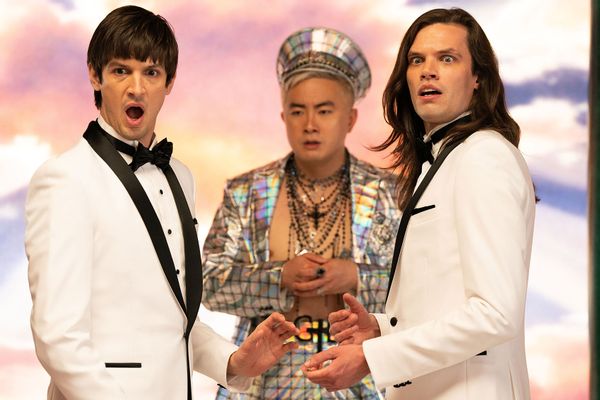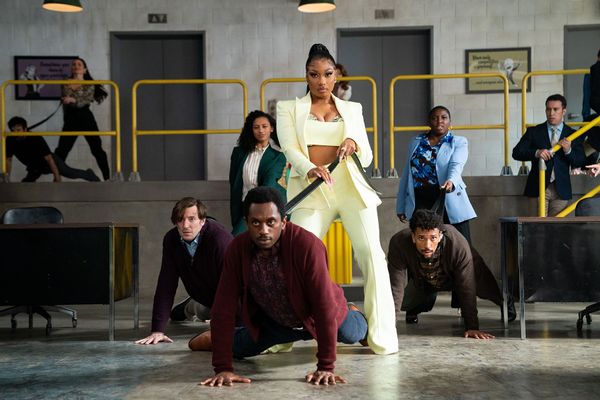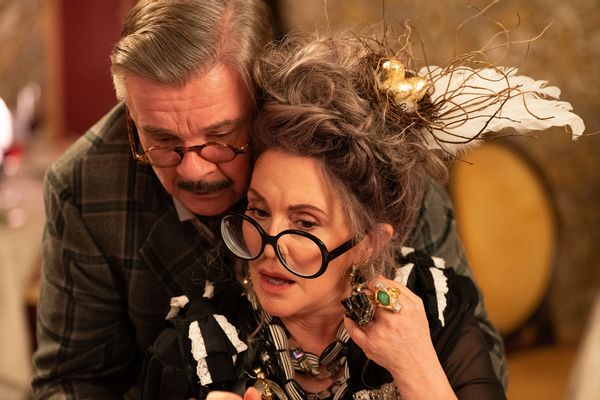
It’s long been one of the biggest challenges when making a comedy and might be more difficult now than it’s ever been: How do you know when you have too many jokes?
The minds behind “Dicks: The Musical” had a very simple answer.
“I think it's other people telling you to stop,” said co-star/co-writer Aaron Jackson, barely able to finish the sentence without laughing.
They had even more opportunities than usual with “Dicks,” an unapologetically irreverent musical about two corporate man-children (played by Jackson and co-writer Josh Sharp) who find out they’re long-separated twin brothers. Before long, they hatch a plan to reunite their parents, all while climbing up the ladder at the new company where they happen to both work.
Jackson and Sharp are experiencing the culmination of a decade-long-year journey that’s had that same push-pull of joke saturation at every step. It’s taken them from supermarket basements to a long run across both coasts’ Upright Citizens Brigade theaters in a half-hour, two-person version of the story they performed themselves. It continued when they enlisted the help of TV and film veteran Larry Charles to direct the film adaptation, which is expanding its release this week via A24. It carried over into the handoff of these characters to a more-than-capable cast, including Megan Mullally, Nathan Lane and Megan Thee Stallion (making her major film role debut).
It even carries over to their press tour. At the start of our conversation, when I ask if we can start “broad” before getting into specifics, without missing a beat, Sharp says, “Alright, we’re gay, Steve. You can put it in print!” There’s always room for an extra laugh.
It helps when you have a team of game collaborators helping to make space for all of it. Throughout our conversation, Jackson and Sharp acknowledge that this unlikely adaptation would not exist without a hefty roster of comedic surrogates. In addition to those mentioned below, they salute co-composer Marius De Vries, the entire art and costume departments, co-star/narrator Bowen Yang, and dancer Casey Bronwyn Howes, who has a memorable solo in the park.
It’s hard to really spoil “Dicks: The Musicals” (except for maybe the movie’s last, biggest swing — there’s a reason we didn’t mention the UCB show’s original title). But from the first question, we’ll get into details that those who want to go into the film cold might want to wait until after watching. Either way, get ready to embrace chaos.
You’re essentially tripling the original length of the show for this film version. What was the one addition that felt like the biggest leap of faith?
Josh Sharp: I would say maybe the Sewer Boys because they were a throwaway joke in the stage show. They just get mentioned once and then so much of it was compressing "The Parent Trap" into a half hour.
We keep joking that we're using "The Parent Trap" like it's a fully accepted story structure. There's "The Odyssey," there's "Romeo and Juliet," there's "The Parent Trap" and now there's "Groundhog Day."
So when we were doing the movie, we couldn't just make it 90 minutes because that's just "The Parent Trap." So it was, "I guess the Sewer Boys are characters, and they're gonna somehow become integral to the plot." None of that had happened on stage.
Aaron Jackson: And I would say the credits. We didn't have that in the stage show. That was a big leap.
Sharp: And in the stage show, Nathan called out every night.
Jackson: You were actually his understudy.
You were permanent swings.
Sharp: It's swings that make this business work. You know this. Patti said it, “We give it all to the swings! It’s how we got through COVID.”
Jackson: Which is over.
Those end credits do give a tiny glimpse into how the Sewer Boys were operated. How many people were involved in that process?
Sharp: There were two designers on set and one in Atlanta. Larry dealt with them a ton on the design of them.
Jackson: Each puppet had four puppeteers. So in the Nathan Lane scenes, there were eight puppeteers working them, which is so funny. The cage had a false back and they were all behind that. The puppeteers had monitors so they could see us, but we only acted with Backpack and Whisper, not the puppeteers.
Sharp: The puppeteers were from the Bob Baker Marionette Theater and they were awesome. A day I'll never forget was when Larry was getting B-roll of the Sewer Boys and he was just barking all of these very specific emotional beats. "You’re scared! OK, now one of you is less scared! You see hope!" And they were nailing everything.

Were there punchlines or jokes that, in the film version, you had to deliver in a fundamentally different way because there wasn’t an audience directly in front of you?
Jackson: There were certain bits that we just knew, "This won't work, so this bit has to go." I’m thinking of a moment in the show when I just fell over in the wheelchair. It was just like full nonsense. But like a lot of the jokes are "setup, punch line, setup, punch line." So those will work.
Sharp: There used to be bits in the stage show when we were switching to play the twins. You would just kill time while you waited for the other person to change into their costumes. They'd be in back, and you’d be riffing on all the things they were doing. "I’m coming! It's taking me a while. Oh my gosh, this hallway is so long!" That would never fly in a movie.
We used to love at the end of the show when we would do "God Is a F****t," we'd say, "God is a . . . " and shove the microphone in their faces only for "f****t" and then see what they did. In this, it’s a bouncing ball because it weirdly felt like the joke still works. It just can be a cinematic version now.
There was a lot of that, thinking, "Does this joke play cinematically or is it just so one-dimensional or punk basement theater that it just doesn't really translate?"
Jackson: The tone of it being a musical and being an absurdist comedy helped. Acting for film is very different than acting for stage, but this kind of acting for film is also very large. It wasn’t, "We have to say these lines more grounded."
When Craig goes to meet Evelyn for the first time, I think I laughed hardest at the size of the puzzle pieces on the table. Were you adding things to that set up until cameras rolled or was that something you had to set longer ahead of time?
Sharp: I have to tell you a hilarious story. There was gonna be a full 1,000-piece puzzle and for some reason, through a production snafu, it had not been communicated that it needed to be built. So they kept pushing that scene all day and they were like, "Oh f**k, we gotta build this." As you know, you can't rush a puzzle. So these poor people spent hours trying to put the puzzle together as we kept bumping that shot to last. And it finally got to the point where we said, "Maybe it's just funnier if we buy a 10-piece kids puzzle."
Jackson: And it really was. That's the serendipity of showbiz. Josh and I are maximalists. We were always like, "More, more, more!" Even behind her set, there’s tables of s**t.
Sharp: You should have seen behind these stages. There were hundreds and hundreds of tchotchkes because it was just cramming stuff everywhere, and you needed options.
Continuing on the Evelyn front, did you and Larry work with Megan on her voice or was that something she showed up with?
Sharp: That was all Mullally, baby. One of the first calls we had with her, she was like, "I'm thinking of doing a voice." We were like, "Trust ya."
Jackson: We did rehearsals, but she came in with this very fully realized character and we just loved it.
Sharp: People sometimes think she's just gonna do Karen Walker every time, and she's like, "No, no, no. That's the reason why I did Karen Walker, because I always like to take a big swing and go to extremes."
She was really important with figuring out the look too. She got all the references as far as being Edie Beale meets Iris Apfel. But she also had this Instagram that was called Advanced Style. It’s all 100-year-old socialite women who are wearing like 1,000 pieces. So she came in with, "I think I should be this type of woman."

They also choreographed our sex scene because they were the people who could go, "Hold each other upside down like a 69, and you can run through the frame!"
Is there a whiteboard somewhere of all the potential X24 titles that you cycled through for that marquee?
Sharp: Oh my God. There’s definitely an email somewhere.
Jackson: We wrote that one first and then we thought maybe there should be posters of other ones.
Sharp: But it just became too visually confusing. I probably could remember some. "Uncut C**ks" was one.
Jackson: There were a lot. "Midcummar" I think was one.
Sharp: It’s not right, but there was something like "Lady Bang." There was a "Lady Bird" one. There was one day where we did a bunch, and none of them could fit. That was the story of this movie, a lot of times people saying, "There’s too many jokes."
I think that carries over into what you’ve done with Karl Saint Lucy, who wrote the songs with you. These are clear song types but they’re not necessarily parodies of those songs.
Jackson: Karl and we very much have the same sensibility. Again, this is a wacko movie. I'm not trying to say it's "Schindler's List" or whatever. But that song where you meet Trevor and Craig, we wanted a walking bass, we wanted horns. Evelyn's is a patter song and it’s very ga-ga-ga-ga-ga, because her brain is sort of everywhere.
I think a lot of modern musicals are just like trying to write hit pop songs, and any character could sing this song. In our movie, only Trevor and Craig could sing that first song. No one else could. It doesn't make sense. Evelyn’s song is like that, and Harris' is a slinky, lounge-y gay guy song. Karl really understood the music is about the characters, and that's very important to musical theater.
Sharp: Some of these jokes are so crazy and dumb that they only work when the music feels real. If you sell it out and make it like comedy music, it doesn't work. We keep saying a lot of these songs are better than they should be, and that's why it works. Some of the lyrics are so absurdist and dumb that you need to ground them in like a real song for it to fly.

And then you have talented people singing them. There’s the part at the end of the song that’s crosscutting between Harris and Evelyn, and Nathan Lane just floats this lovely falsetto at the end.
Sharp: That wasn't in the demo version. It was just like a thing he wanted to do.
Jackson: That's one of the originals for the movie. Both of them would come to us with ideas. We’d change a bridge of a song because Nathan or Megan had an idea. That's one of the very, very fun parts of collaboration. And it turns out multiple award-winning actor Nathan Lane is, like, good at acting.
Sharp: When he's saying goodbye to the Sewer Boys, it's incredible that he can wrench emotion out of this because it works on you. That also is the joke: Can you believe he's really f**king doing it, and he's not selling it out, not one bit? It's so fun to have people like that in this who fully get the joke but also are capable of this level of commitment and performance that adds an extra layer to it.
Speaking of commitment: Aaron, when Trevor keeps shouting "NO!" at the reveal of the Sewer Boys, how in the world did you do that without shredding your vocal chords? I assume you couldn’t do too many takes of that.
Sharp: This is an Aaron Jackson signature, and I'm so happy it’s finally immortalized on film.
Jackson: It actually was a lot of takes. If I had to do eight shows a week of that, I think maybe I'd have to modify it. But it actually is weirdly vocally healthy.
Sharp: It's about breath support.
Jackson: It's a placement in my throat. It's hard to explain, but I'm taking care of these little babies.
Having seen this a few times now with audiences, are there things that people have really responded to that even surpass what you had hoped or expected?
Jackson: Some of the moments that really shocked me are jokes that were successful in the stage show but they're still in it. And now Nathan Lane and Megan Mullally are saying them and the crowd is going wild. Sometimes we'll turn to each other and be like, "Oh my God. That's our old-a** joke and these people are saying it and it's killing."
Sharp: There was a discussion in post where we were like, "When the song ends, should we put a little thing or someone in the corner that says 'Applaud'?’’ Because it's fun when the audience knows you're allowed to clap. And they've been doing it every time of their own accord. I was always hoping it would be that kind of vibe, where you're allowed to be present together, enjoying this movie.







